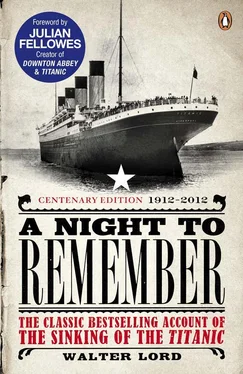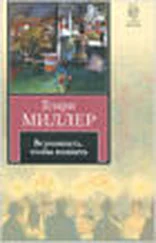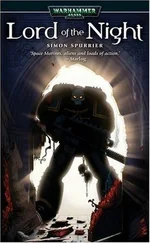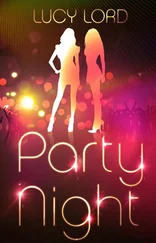I was recently in Budapest, where they were filming my scripts for the ITV/Indigo production of the story. Standing alone on the huge sets, astonishing replicas of the promenade deck and the boat deck, it was impossible not to think of that moment, a hundred years before, when some of the great names of Belgravia and Newport stood, in silent and dignified groups, waiting to learn their fate. The American Croesus John Jacob Astor and his pregnant young wife, Madeleine; the banking Wideners of Philadelphia; the railway king Charles Hays; the hedonist Benjamin Guggenheim; the silent-movie queen Dorothy Gibson; and behind them all those other men, women and children, rich and poor, old and young, from every background under the sun, for whom the next hundred minutes would deliver them either to life or to death.
Despite the wealth of new evidence gleaned from the discovery of the wreck, long after this book was first published, some of the mysteries of the sinking will probably never be solved. Why some piece of crucial equipment was mislaid, why this telegram was ignored, why that warning went unremarked.
And, like most of us, I am not sure of the lessons we can draw from this awful story; maybe just that we cannot know what Fate has in store, that we should not forget man is never the superior of nature, or simply that ordinary men and women are capable of acts of courage and kindness that make them great in the doing. Perhaps that’s it. That savage events can inspire people to greatness.
Certainly, we cannot predict how we would behave in such a case, but we can hope and even pray that we would act as nobly as so many of the victims did, on that dark and terrible Atlantic night.
Julian Fellowes
August 2011
Introduction by Brian Lavery
When A Night to Remember was first published in the United States in 1955, Burke Wilkinson, in the New York Times , wrote that ‘the author’s style is so simple as to be almost an absence of style. But his great story needs no gilding, and he has given us that rarest of experiences—a book whose total effect is greater than the sum of its parts’. Stanley Walker of the New York Herald Tribune claimed that it was based on ‘a kind of literary pointillism, the arrangement of contrasting bits of fact and emotion in such a fashion that a vividly real impression of an event is conveyed to the reader’.
When it was published in Britain in the following year, the reviewers were divided along political lines. In the Illustrated London News Sir John Squire, a poet and historian who had flirted with both Marxism and fascism in his time, found that Lord’s populist approach to disaster ‘slightly disgusts me’. The conservative Times thought that Lord had been unfair to the ship’s owner, Bruce Ismay, who had escaped from the disaster. The high loss of life among the poor steerage passengers, it was claimed, was due to shortage of lifeboats and not class distinction. To the left-wing New Statesman , the disaster was caused by ‘complacency and commercialism… the attempt of the White Star Line to wring the last penny out of the profitable Atlantic trade’. But most reviewers saw it as having all the elements of a Greek tragedy.
Whatever the reviewers might think, the book sold very well and made Lord’s reputation as a storyteller. It was filmed in 1958 with the highly popular British star Kenneth More in the role of Second Officer Charles Lightoller. The book helped to establish the idea of reporting a dramatic event through the accounts of ordinary people involved, which was used, for example, by Cornelius Ryan in The Longest Day . And it put the ageing story of the Titanic back in the forefront of the public consciousness.
However much one would like to say about the millions of people who built ships or sailed in them as passengers and crew, it is impossible for a maritime historian to escape from iconic characters such as Lord Nelson, and dramatic events such as the sinking of the Titanic . But it is quite likely that the Titanic would be almost forgotten now, or known only to specialists, if Walter Lord had not researched and published his most famous book at just the right moment.
By the 1950s the sinking had been overshadowed by two world wars, and it was no longer the greatest maritime disaster of all time—for Britain that distinction went to the Lancastria , sunk off Le Havre in 1940 with 2,500 people on board. In world terms the greatest loss of life was in the German Wilhelm Gustloff in the Baltic in 1945, when an estimated 7,000 people, including many refugees, were killed. But, of course, these were wartime disasters, unlike the Titanic , which sank in the calm waters of a peaceful world.
Lord was motivated by his love of the great liners, which he had travelled in as a boy with his parents, including a trip in the Titanic ’s surviving sister-ship, Olympic , in 1927. He was fascinated by the idea of a closed society like a town afloat, even if the passengers were only on board for a week or so. He was researching his book at the right time, partly because many of the survivors were still alive and had fresh memories of events more than forty years before. Perhaps they were far enough from the disaster to get over any survivor’s guilt, or the traumas of the night in question.
But Lord did not make use of one new invention which a modern researcher would regard as essential: the tape recorder. Nor did he take notes during the interviews, for fear of intimidating the witnesses. Instead, he prepared his questions for each interview very carefully, and memorized what was said, writing them down afterwards as soon as he found privacy.
The book was also published at exactly the right time. The television age was just beginning, but the public was already used to the immediacy of newsreel and radio reporting, and the highlighting of individual stories in the midst of historic events. Despite the reactions of some traditional historians, history was no longer about kings, queens and presidents but about how it was shaped by people of both high and low status.
Like most history books, A Night to Remember is about the time in which it was written as well as the period it describes. America in the 1950s was more prosperous than it had ever been, and it felt a great moral superiority after defeating the Nazis and taking on the Soviets in the Cold War. As Lord is careful to point out, it was far more classless than the society of 1912. Yet it too had a huge threat hanging over it, as the Soviets built up an increasingly terrifying nuclear arsenal, with thermonuclear bombs and ballistic missiles. Britain was no less threatened by the bomb, and its people had far less space to hide from it. It was about to face its own sinking moment, when the Suez Crisis of 1956 signalled the end of the British Empire. Lord does not deal with the issue of race, which was about to engulf the United States and, to a lesser extent, Britain. Many British shipping lines employed Africans and Asians as firemen, stewards and seamen, but not White Star. Almost everyone aboard the Titanic , both passengers and crew, was white (though there is casual mention of Chinese and Japanese) and racialism, which was an essential and largely unspoken feature of 1912 society, was directed against what were considered the ‘lesser’ European races such as the Italians.
Lord begins his story with the first sighting of the iceberg, and the world outside the ship appears only incidentally, increasing the feeling of peril and claustrophobia among those on board. He portrays the sinking as a slow-motion disaster, with its extent dawning on crew and passengers only by degrees. As he wrote in 1987, part of the appeal of the story relies on ‘the initial refusal to believe that anything was wrong—card games continued in the smoking room; playful soccer matches on deck with chunks of ice broken off from the berg. Then the gradual dawning that there is real danger—the growing tilt of the deck, the rockets going off. And finally, the realization that the end is at hand, with no apparent escape.’ Lord also starts with different levels in the ship—the lookout at the head of the mast, the officers on the bridge, the passengers in the saloons and the firemen down in the engine room. He explores the alternative hierarchies on board—the normal social one and the sea discipline, with officers commanding seamen, who in turn are nominally in charge of the passengers in a lifeboat—though in real life they were often challenged successfully by the first-class passengers, who believed they had a right to rule in any circumstances.
Читать дальше












